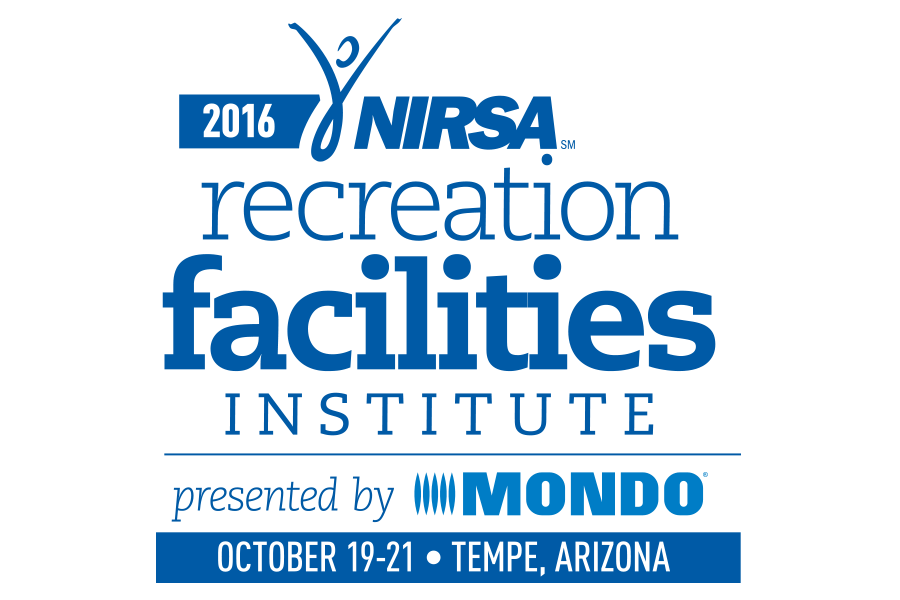This schedule is subject to change. Please contact us if you have any questions.
Tuesday, October 18
- Tuesday, October 18 • 10:45am – 11:45am
- Registration
- Tuesday, October 18 • Noon – 9:30pm
- Tour
Attendees will tour the University of Arizona Student Recreation Center and the Kino Sports Complex. Dinner is included, but lunch will not be provided so please eat before or bring a lunch for the bus ride.
Sustainable Communities
- Tuesday, October 18 • 3:35pm – 4:35pm
- University of Arizona
- William Massey, Sasaki Associates, Inc.; Chet Phillips, University of Arizona; John Lloyd, University of Arizona; Meg Rapp, Populous
Campus recreation advocates and facilitates healthy lifestyles and physical activity for a diverse population of students, faculty, staff, and surrounding community. Valuing sustainability in collegiate recreation has been growing, desires to improve quality of life and become more economically and environmentally sustainable in our rec facilities and on campuses are an ever present goal. So how do we build sustainable communities? In this session, presenters will share some of their ideas on what building sustainable communities has meant through their personal and professional experiences.
Core Competencies: Facility Management, Planning & Design; Programming; Business Management; Personal & Professional Qualities
Learning Objectives:
- Identify three ways sustainability contributes to community and individual health and wellness.
- Understand the impact of sustainability on community, from the campus scale to the building scale.
Wednesday, October 19
- Wednesday, October 19 • 7:30am – 8:50am
- Registration
Sustainable Communities

- Wednesday, October 19 • 9:00am – 10:15am
- Phoenix Ballroom B
Welcome attendees! Join us for the 2016 Facilities Institute kickoff, presented by Life Fitness, and listen to Keynote Speaker, Meg Rapp, discuss the past, present, and possible future trends in sustainability as it pertains to campus recreation, within the realm of facility planning, design and construction.
Facility Construction & Design
- 0.1 NIRSA CEUs
- Wednesday, October 19 • 10:30am – 11:30am
- Phoenix Ballroom B
- Chad Morgan, Arizona State University; Dustin Soderman, Arizona State University; James Braam, HOK
This session will be an interactive dialogue with the directors who made the ASU Sun Devil Fitness Centers happen. Learn how ASU strategized to program, design, build, operate, and open four facilities for four different campuses all at once. There will be an opportunity to ask questions.
Core Competencies: Facility Management, Planning & Design; Personal & Professional Qualities; Philosophy & Theory
Learning Objectives:
- Learn how to build a game plan for operations concerns like staffing, safety precautions, and hospitality.
- Learn how to manage a staff and incorporate the best technology for maximum efficiency.
- Learn how to create a program that considers costs, efficiency, fitness trends, and the uniqueness of your own institution.

- Wednesday, October 19 • 11:30am – Noon
- Bus Pickup
Boxed lunches are provided for all attendees today, presented by Plae, and will be served at the conclusion of the morning sessions. Come grab a lunch before embarking on the Facility Tours, buses are a great place to network or catch up with old friends!

- Wednesday, October 19 • Noon – 6:00pm
- Tour
Buses depart from the host hotel promptly at noon. Attendees will tour Arizona State University: Sun Devil Fitness Complex Polytechnic, Ability360 Sports and Fitness Center, Arizona State University: Sun Devil Fitness Complex Tempe, and Arizona State University: Sun Devil Fitness Complex Downtown. Today’s Facility Tour is presented by Precor. A box lunch will be provided prior to boarding the buses.

- Wednesday, October 19 • 7:30pm – 9:00pm
- Phoenix Ballroom Foyer
Calling all Facilities Institute Attendees: immediately following the Facility Tours, please plan to join fellow peers and colleagues for food and beverage at the 2016 Facilities Institute Welcome Social, presented by TechnoGym. This fantastic networking opportunity will be held in Phoenix Ballroom Foyer from 7:30pm-9:00pm.
Thursday, October 20
Facility Construction & Design
- 0.1 NIRSA CEUs
- Thursday, October 20 • 8:00am – 9:00am
- Phoenix Ballroom A
- William Massey, Sasaki Associates, Inc.; Emily Parris, Sasaki Associates, Inc.; Silvia Chan, CRSS, University of Connecticut
This presentation provides a high-level overview of the process of building a new recreation center from the perspectives of both recreational staff and the architects who design them. We will describe the stages of institutional approval, design and construction, funding strategies, the participants involved, typical schedule duration, and common mistakes and how to avoid them. Our goal is to demystify the process and terminology as we familiarize recreation professionals with the road ahead as they renovate or create a new facility.
Core Competencies: Facility Management, Planning & Design; Programming; Business Management; Human Resource Management
Learning Objectives:
- Understand the process of design, funding, approval, and construction for a recreation center.
- Understand who”s who as participants in the design, approval, and construction process.
- Learn about pitfalls and common mistakes and how to avoid them.
Facility Construction & Design
- 0.1 NIRSA CEUs
- Thursday, October 20 • 8:00am – 9:00am
- Phoenix Ballroom B
- Nigel Harris, The University of Texas At San Antonio; Greg Houston, Marmon Mok Architecture; Rick Hall, CRSS, Texas A & M University-College Station
Aquatics recreation programs continue to grow in popularity, which places increased pressure on university capital improvement budgets and operating budgets. This means new projects require extensive economic justification to be developed. Listen to two major university aquatics operators discuss their aquatics project development processes; learn how they developed and maintained projects that delivered what the customer wants, fulfilled the economic benefit analysis, and conserved resources. Attendees may participate in an interactive survey comparing their aquatic program activities to results from a national survey.
Core Competencies: Programming; Facility Management, Planning & Design
Learning Objectives:
- Understand how to develop an activity-based, operational pro forma to prioritize options for an aquatic facility expansion.
- Identify five “hidden” costs which may affect the development of your aquatics expansion or renovation project.
- Be able to articulate three strategies to reduce water and energy consumption and improve the bottom line.
Facility Management & Operations
- Thursday, October 20 • 9:15am – 10:15am
- Phoenix Ballroom B
- Gregory Haverlock, University of South Florida-St. Petersburg Campus; Lashica Thomas, Columbus State University; Phil Carter, Arizona State University
Join us in sharing resources, ideas, and information regarding recreation facilities and facility operations on campus. If you have a question about your facility, the group may have great solutions!
Core Competencies: Legal Liability & Risk Management; Facility Management, Planning & Design; Human Resource Management

- Thursday, October 20 • 10:15am – 10:45am
- Phoenix Ballroom Foyer
Take a quick break between sessions to grab a cup of joe! Thanks to our sponsor Matrix.
Facility Construction & Design
- 0.1 NIRSA CEUs
- Thursday, October 20 • 10:45am – 11:45am
- Phoenix Ballroom A
- Meg Rapp, Populous; Laurie Braden, RCRSP, CRSS, Louisiana State University; Rich Gray, PLAE
This panel discussion will explore the integration of project operations, design, and product teams to create new recreation spaces that inspire engagement both inside and outside the walls of the recreation center using play. From recreation directors to architects and designers to product manufacturers and suppliers, we each bring a unique knowledge of performance-based functional fitness to the development of new ways to recreate and play.
Core Competencies: Facility Management, Planning & Design
Learning Objectives:
- Be able to explain the value of play in recreation.
- Learn to recognize spaces that could benefit from outdoor activation.
- Identify the challenges associated with creating indoor/outdoor recreation and play spaces.
Facility Construction & Design
- 0.1 NIRSA CEUs
- Thursday, October 20 • 10:45am – 11:45am
- Phoenix Ballroom B
- Jack Patton, RDG Planning & Design; Nathan Harris, RDG Planning & Design
This session will focus exclusively on bad deign decisions. It will teach you how to avoid them in your facility. Using reviews and critiques from recent clients, facility users, and casual observers, we will objectively bare all in pursuit of helping you consider and evaluate the best possible recreation facility designs. We will show you the best of the best in modern facility design. But, more importantly, we will show you where and why poor programming, design, and detailing decisions were made. Through this presentation we will show you tools and techniques to avoid similar poor decisions.
Core Competencies: Facility Management, Planning & Design; Research & Evaluation
Learning Objectives:
- Learn how good and bad decisions can be made during a design process, and arm yourself with knowledge to avoid the bad ones.
- Understand what others have done in design and programming that hindered their successful facility planning and design.
- Evaluate the decisions of others as part of a comparative analysis of your own facility design.

- Thursday, October 20 • 11:45am – 1:45pm
- Embassy Court/Lobby/Phoenix Ballroom Foyer
Lunch is served! The 2016 NIRSA Recreation Facilities Institute Networking Lunch & Expo, presented by Core Health & Fitness, will be held in Phoenix Ballroom B from 11:45am-1:45pm. This opportunity is your chance to engage with vendors who will be available to answer questions about their product or service.
Facility Programming
- 0.1 NIRSA CEUs
- Thursday, October 20 • 1:45pm – 2:45pm
- Phoenix Ballroom A
- Jennifer Pecoraro, Georgia Institute of Technology
You’ve built your facility. Now what? Learn how the Americans with Disabilities Act applies to campus recreation, and what responsibilities we have as professionals to promote equity and inclusion. Combine ADA facility amenities with compliant programming, marketing, and more!
Core Competencies: Programming; Philosophy & Theory; Research & Evaluation
Learning Objectives:
- Identify five programs and services your campus recreation department currently offers and learn how to adapt them to become ADA compliant as defined.
- Develop one ADA-compliant program to be implemented at your campus recreation center.
- Identify at least two strategic marketing strategies for ADA programming, and learn at least three customer service phrases in sign language with sufficient efficiency that you can teach them to your campus recreation center staff. Learn at least three (3) customer service phrases in sign language with sufficient efficiency to implement among your campus recreation center staff.
Facility Construction & Design; Aquatics
- 0.1 NIRSA CEUs
- Thursday, October 20 • 1:45pm – 2:45pm
- Phoenix Ballroom B
- Dennis Berkshire, Aquatic Design Group
Take a look at current and future trends in collegiate aquatics. These include design, energy efficiency which translates to reducing costs, how to maximize revenue through new programs, and wellness. Also learn about expectations, legal implications, and changing codes surrounding social interactions.
Core Competencies: Facility Management, Planning & Design; Programming; Business Management
Learning Objectives:
- Explore the explosion of the modern aquatic center in collegiate recreation centers by specifically looking at current trends in programming and how designs are changing to accommodate them.
- Be able to identify and explain design and operations strategies that reduce operating expenses, increase energy efficiency, and reduce staffing costs. Also, explore programming strategies that create incremental revenue generation opportunities.
- Peer into the future of aquatics to consider where the industry is going and how to avoid potential issues that may be on the horizon like changing demographics, codes, and legal issues.
Facility Construction & Design
- 0.1 NIRSA CEUs
- Thursday, October 20 • 3:00pm – 4:00pm
- Phoenix Ballroom A
- James Stalford, Mondo America, Inc.; Jeremy Wilson, Life Fitness; Micah Walters, Clemson University; Steve Hayes, Aacer Flooring
Recreation facilities are faced with numerous liability issues. Learn how to best design or renovate your facility to limit exposure to injury and enhance the wellbeing of your users.
Core Competencies: Facility Management, Planning & Design; Legal Liability & Risk Management; Business Management; Research & Evaluation
Learning Objectives:
- Learn how to work with experts to select materials and equipment as well as to plan a safe layout and flow for athletic spaces.
- Understand the limitations of equipment and materials to better decrease exposure to injury.
- Gain an understanding of the new trends and standards in recreation and fitness spaces.
Facility Construction & Design
- 0.1 NIRSA CEUs
- Thursday, October 20 • 3:00pm – 4:00pm
- Phoenix Ballroom B
- Clint Menefee, SmithGroupJJR; Jeremy Battjes, University of Arkansas
Due to a shortage of available land on campus, many institutions are looking for playing fields and other activity spaces off campus. The University of Arkansas is in the middle of a three-phase outdoor facility overhaul. Learn how their experience can help you improve your outdoor facilities, programming, and maintenance.
Core Competencies: Facility Management, Planning & Design; Programming
Learning Objectives:
- Get inspired and learn from the University of Arkansas’ new outdoor facilities.
- Learn about current trends in outdoor recreational programming.
- Understand the technical requirements of playing fields and other outdoor recreational environments.
Facility Construction & Design
- Thursday, October 20 • 4:15pm – 5:45pm
- Phoenix Ballroom B
- Chad Morgan, Arizona State University West; Chad Ellsworth, Sun Devil Fitness Complex Downtown; Jeff Vance, Arizona State University Polytechnic; John Lloyd, University of Arizona; Meg Rapp, Populous; Reenie Ochoa, Kino Sports Complex; Tamra Garstka, CRSS, Arizona State University Tempe; Tina Villard, Rice University
Join your colleagues and listen to representatives from this year’s toured facilities providing you with more insight on positive outcomes and lessons learned from their latest facility builds and renovations; there will be time for Q & A.
Friday, October 21
Facility Construction & Design
- 0.1 NIRSA CEUs
- Friday, October 21 • 8:00am – 9:00am
- Phoenix Ballroom A
- Erik Kocher, Hastings+Chivetta Architects, Inc.
The legal waters surrounding facilities that are inclusive regarding gender and religion are murky. This gives institutions the opportunity and responsibility to determine what is appropriate for their own students and on their campus when renovating or building new recreation centers.
Core Competencies: Facility Management, Planning & Design; Philosophy & Theory; Programming; Legal Liability & Risk Management
Learning Objectives:
- Learn about current code requirements and how locker rooms, restrooms, and more can follow code while still creating an inclusive environment.
- Find subtle and cost-effective ways to create a welcoming environment for all students, faculty, and staff.
- Understand the hard costs involved with making programming and design decisions that consider inclusivity.
Facility Programming
- 0.1 NIRSA CEUs
- Friday, October 21 • 8:00am – 9:00am
- Phoenix Ballroom B
- Pamela Hightower, InnoSoft Canada Inc.
Millennials are the current generation dominating our student employee and student membership populations. This presentation will address some myths and opportunities regarding millennials that you can address with your tech tools. Primarily, this presentation will discuss selecting intuitive tools that are convenient and easy to explain to customers. Join this conversation to explore best practices for meeting and keeping your customers with your online tools.
Core Competencies: Philosophy & Theory; Programming; Research & Evaluation
Learning Objectives:
- Identify three trends in online searching and purchasing behaviors.
- Through interacting with colleagues, identify common program engagement needs and related best practices for addressing those needs.
- Will learn how to maximize revenue returns by analyzing three recreation department budget models and related financial collections strategies.
Facility Management & Operations
- Friday, October 21 • 9:15am – 10:45am
- Phoenix Ballroom B
- Todd Hammonds, University of California, Santa Cruz; Tina Villard, Rice University; Tom Woodman, The University of Texas at Arlington
It takes a lot of resources to maintain a facility at the best levels. Join fellow recreational sports professionals to share and discuss the art of negotiation in the management of staff, vendor relationships, and the purchase of equipment/supplies. Reflect and share strategies that you use to reduce costs, improve inefficiencies and increase staff productivity in the management of your facility.
- Friday, October 21 • 10:45am – 11:00am
- Bus Pickup
Boxed lunches are provided for all attendees today and will be served at the conclusion of the morning sessions. Come grab a lunch before embarking on the Facility Tours, buses are a great place to network or catch up with old friends!

- Friday, October 21 • 11:00am – 4:30pm
- Tour
Buses depart from the host hotel promptly at noon. Attendees will tour Arizona State University: Sun Devil Fitness Complex West and University of Phoenix Stadium. Today’s tours are presented by Populous. A box lunch will be provided prior to boarding the buses.


